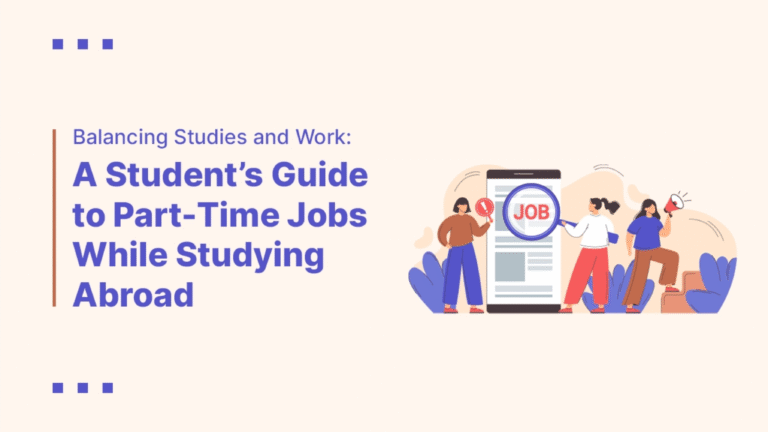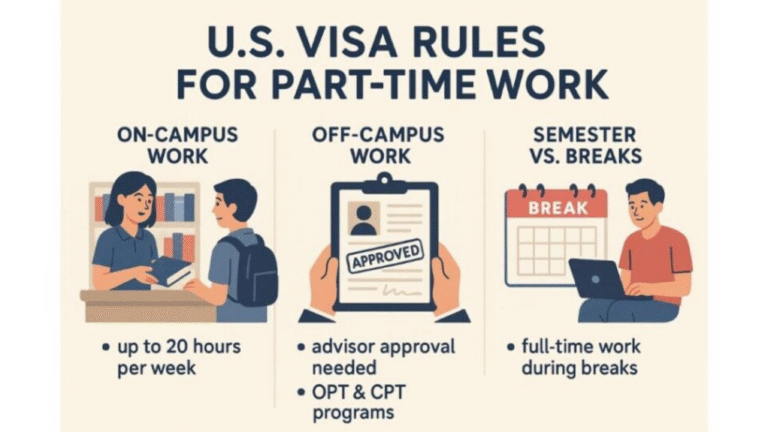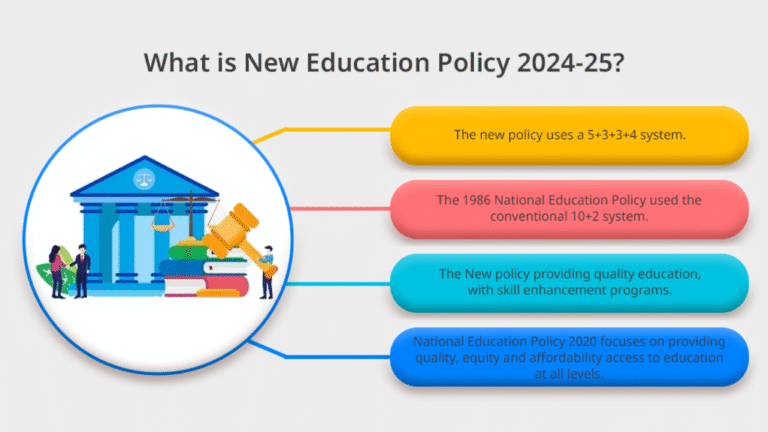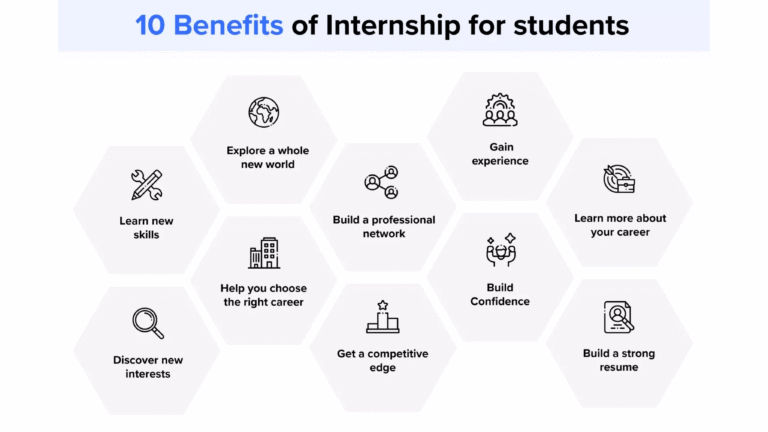Study Abroad Consultants In Delhi
- support@teachwell.co.in
- +91 93103 80899
- support@teachwell.co.in
- +91 93103 80899

Internships & Part-Time Jobs Abroad: How to Earn While You Study in 2025

Studying abroad has long been a desire among individuals who want access to global education, diversity, and future career opportunities around the world. As an international student studying abroad, it’s important to recognize that your finances may become substantially strained at some point. Tuition, living costs, as well as travel expenses, quickly add up to far more than you originally wanted! That’s when an intern or Part-Time Jobs come into play! Not only will you begin to earn money, but you will also be able to write on your CV the important aspect of experience! As you apply to study abroad in 2025, the situation for those seeking to work while studying abroad has changed and it is important to understand regulations and opportunities for a “successful” study abroad.
This blog is going to walk you through how students navigate part-time jobs or internship abroad, the benefits, some opportunities that are popular, and how to balance work and study.
Why Students Should Consider Internships & Part-Time Jobs Abroad
Balancing studies and work might seem daunting, but the benefits are significant. Here are some reasons why taking up part-time jobs or internships while studying abroad can be a game-changer:
1. Financial Support
The most apparent advantage of working whilst studying is drawing financial support. Depending on the country, students can earn $10 to $25 per hour working part time. This income could help with rent, help pay for book expenses, and even allow students to travel during breaks. For students in the USA, UK, Canada, and Australia, work regulations are generally friendly to student work while studying.
2. Skill Development
Internships and part-time positions are more than money; they are effective ways to develop valuable practical skills. You will be exposed to soft skills in the workplace such as communications, team work, time management, and problem-solving skills. You will also learn skills specific to your field of study that will make you more employable upon graduation.
3. Networking Opportunities
When you think about working abroad, you are really thinking about becoming connected to other professionals, fellow students, and local communities. Falling into these networks can lead to mentorship, references, or even permanent jobs when you graduate. Working abroad will also give you a competitive advantage over and above an academic experience.
4. Cultural Exposure
Engaging in part-time work or internships offers you the opportunity to experience the culture at a deeper level than you would receive from the classroom. This culture exposure provides you with experience in developing adaptability, communication across cultures and a global mindset, which are all highly sought-after competencies in the current job market.

Understanding Work Regulations for Students in 2025
Before you apply to get a part-time jobs or internships abroad, it’s important to understand the laws pertaining to student work. What are the rules with respect to working hours, types, and eligibility in different countries?
1. United States
Students on an F-1 visa, which is intended for studying in the United States, can usually work up to 20 hours per week while classes are in session, and can work full-time during breaks. Optional Practical Training (OPT) and Curricular Practical Training (CPT) would be two great ways to gain practical experience in your field.
2. United Kingdom
In the United Kingdom, students are allowed to work a maximum of 20 hours per week whilst studying and full-time during holiday periods. The post-study work visa program, introduced in 2021, continues to be available in 2025, allowing graduates to gain professional work experience in the UK soon after their degree is completed.
3. Canada
Canadian students are allowed to work 20 hours each week while they are studying, and they may work full time during their scheduled breaks. The Post-Graduation Work Permit (PGWP) provides students with Canadian work experience after graduation.
4. Australia
In Australia, students are able to work a maximum of 40 hours over a 2 week period while their classes are in session, and they can work unlimited hours during breaks. Universities offer work integrated learning programs which offer an opportunity for students to undertake paid work experience as a part of their university program or course.
5. Other Countries
Countries such as Germany, France, and the Netherlands have similar rules that permit students to work limited hours while they study. Some countries also offer some additional programs or incentives for students doing internships related to their studies.
Discover more about studying abroad and earning opportunities in 2025 on our Study Abroad Tips

Popular Part-Time Jobs for Students Abroad
Finding the right part-time job depends on your skills, schedule, and visa regulations. Here are some of the most popular options for international students in 2025:
1. On-Campus Jobs
Many universities offer on-campus jobs such as library assistants, lab assistants, or administrative roles. These jobs are often flexible, conveniently located, and understanding of academic schedules.
2. Retail and Hospitality
As a student, employment opportunities at cafés, restaurants, and retail stores are among the easiest jobs to secure. While your job may not be directly aligned with your career development goals, you will gain customer service experience, interpersonal skills and time management skills from your job.
3. Freelancing & Online Work
With remote work becoming more prevalent, students can also begin freelancing, for example in content writing, graphic design, programming, or social media management. Freelancing offers students flexibility, allowing them to work remotely from their dorm or apartment, without commuting.
4. Tutoring
Tutoring is an excellent option for students with strong academic backgrounds. You can tutor high school students, peers, or even offer language lessons, depending on your expertise. It’s a rewarding way to earn money while reinforcing your own knowledge.
5. Internships
Internships may be paid or unpaid, but unpaid internships still provide valuable networking opportunities and practical skills. Paid internships are the best of both worlds since you gain income in exchange for gaining experience in your field.
Learn about UK student work regulations and part-time opportunities from the official
How to Find Part-Time Jobs Abroad

Finding a good part-time job takes research, preparation, and networking. Here’s how to get started:
1. University Career Services
Most universities have career services or similar offices to help students find internships and part-time jobs. A career service office may offer job postings, resume review, interview prep, and career events.
2. Job Listings Online
Websites such as LinkedIn, Indeed, Glassdoor, and local job boards are great resources. Students shouldtake time to set up a professional profile, set job alerts, and apply for jobs relevant to student skills or interest.
3. Networking
Networking is always a great tool to find a job. Speak with alumni, professors, or friends who have part-time job experience. Attend workshops, or seminars, or take advantage of university events to make connections that could lead to opportunities.
4. Social Media and Freelance Sites
Social media groups and freelance sites such as Fiverr, Upwork, and Freelancer may help you find work online, and sometimes part-time gigs. Many companies also use those types of sites to post student-friendly jobs.
5. Direct Applications
Some students apply directly to local businesses, cafes, bookstores, retail locations, etc. If you walk in with a resume and a smile, you may find these applications more fruitful than applying online—and you can meet your potential employer face-to-face!
Balancing Work and Studies
While the allure of making money is notable, your first obligation is to your education. Juggling part-time employment with your education necessitates forethought and discipline.
1. Time Management
Establishing a proactive timetable will help you prioritize your academic responsibilities and manage a reasonable number of hours for work. Overextending yourself is unwise because burnout can directly impact your performance in both school and work.
2. Communication with Employers
Be open and honest with your employer about your obligations to school. Many employers are student-friendly and will accommodate flexible schedules during exams and projects.
3. Set Realistic Goals
Be specific about what you hope to gain from a job or internship. Whether it is to build a savings account, acquire new experiences, or create opportunity for professional networking, knowing the purpose will help you stay focused and motivated.
4. Take Care of Yourself
Juggling work, study, and your own personal life can lead to a high level of stress. Be sure to sleep adequately, eat healthy, and engage in social activity and relaxation time. Your own mental and physical health must come before anything else.
Advantages of Combining Internships with Part-Time Jobs

Many students opt to couple their internship with a part-time role to increase experience and income. This can be a great advantage if done in an appropriate manner:
Expanded Resume: Employers are impressed when students possess competency related to academic learning and applied work experiences. Combining or infiltrating internships or part-time jobs with an internship can show flexibility and dedication.
Financial Independence: Although a part-time job will help cover daily expenses, a paid internship can provide experience in the field while paying you extra for your time.
Skill Enhancement: Internships usually provide you with technical skills while part-time positions often increase your soft skills, leading to a more diverse professional format.
Expanded Networking: Working in two niche environments puts you in a position to acquire a diverse professional network, hopefully increasing your chances of securing work after graduation.
Tips for Success in Part-Time Jobs Abroad
To succeed in part-time jobs abroad, you need to be prepared, professional, and focused. Here are some tips:
Put Together a Good Resume: Take the time to demonstrate your skills, education, and relevant experience. When applying for jobs, change your resume for each job you apply for.
Prepare for Interview Questions: Research typical interview questions for students, and practice your clear, confident answers to avoid freezing in front of a potential employer.
Be Punctual and Reliable: Every employment opportunity values students who display responsibility, dependability and strong work ethic.
Learn to Work Culturally: Knowing about local work culture, or the local normative communication behaviors someone uses in the workplace, professionalism, etc. can help you settle in easier.
Utilize the Skills You Gain to Better Your Employment Opportunities: Use your first few roles as part-time jobs to secure experience, or knowledge of the profession and apply for a higher paying or better jobs as you move along.
Future Outlook: Part-Time Jobs for Students in 2025
In 2025, the interest in flexible student employment continues to grow with globalization, remote work, and digital platforms. Employers are more cognizant of employing international students in part-time positions to gain a new perspective and improved skill set. In addition, many governments and educational institutions have established more intentional programs to help students make systematic connections between study and work.
With proper planning and a proactive approach, students can leverage part-time work and internships to enhance their international study experience in a financially viable, enjoyable, and professional way.
Conclusion:
In 2025, part-time work and internships overseas represent more than a source of income, they provide an opportunity to learn skills, network, and immerse in a culture. Students can improve their study experience by understanding what they are permitted to do, thinking about and looking for work opportunities, and managing time effectively in the process. It takes commitment to balance study and casual work, but the outcomes of building independence, creating projects to grow professionally, and standing out among a very competitive global job market make it worthwhile for every international student.